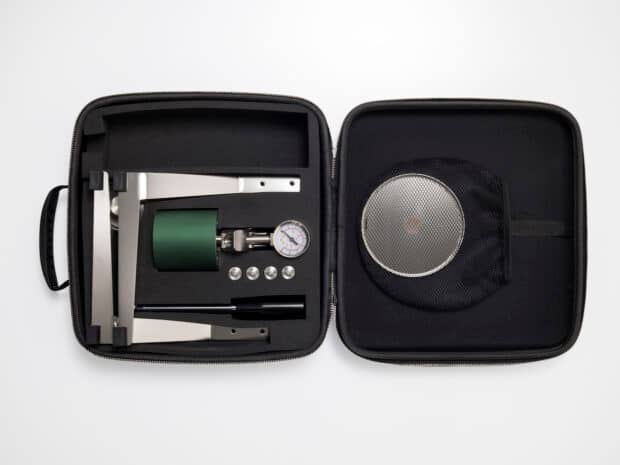[[{“value”:”
Long-running Swiss espresso equipment maker Olympia Express recently launched pre-order sales of its first electricity-free portable coffee device, the Olympia Express Mina.
Including a travel case, the compact Olympia Express Mina launched June 27 at a price of $999.
Manufactured in Switzerland almost entirely from steel, aluminum and brass, the new machine is centered on an open-top version of the direct manual lever group found on the company’s best-known home espresso maker, the Olympia Cremina. The Mina’s group rests atop a portable stand that disassembles and packs flat into the case.
The Mina joins a growing field of open-top, non-electronic manual lever devices such as the Flair, the Newton Brua and the more recently launched MHW-3Bomber Sonic S7.
The Mina requires users to add hot water to the top of its stainless-steel group for a preheat flush, and again for brewing.
Lifting the lever allows hot water to flow by gravity into the brewing chamber, then lowering it applies direct force onto the water that meets the resistance of the finely ground coffee. The Mina’s group-mounted manometer displays the applied pressure.
Olympia Express introduced the Cremina home espresso machine in 1967. The design has remained virtually unchanged since then, and the Cremina continues to find fans among home espresso aficionados.
In 1974, Olympia Express followed the original Cremina with the electric pump-driven Maximatic espresso machine, and in 2020 the company launched the Cremina SL, a spring-driven variant of the classic lever machine.
The company was founded as Olimpia Express in 1928 by Luigi Bresaolo in the Southern Switzerland town of Chiasso, near the Italian border. Its original products were steam-driven espresso machines for the commercial cafe, bar and hospitality sectors. In the late 1960s, family ownership entered its second generation with Luigi Bresaolo Jr.
Ownership and headquarters have changed multiple times since the 1990s. In 2010, Olympia Express was acquired by Schatti AG Metallwarenfabrik, with Thomas Schatti serving as chief executive. The company and its manufacturing have been based in Glarus, Switzerland, since 2011.
Sascha Matiz, Schatti AG Metallwarenfabrik’s department manager in charge of Olympia Express, led the team that designed the Mina through its two-year development.
In the meantime, the company last year also launched the Moca SD, a single-dose grinder with 64-millimeter flat hardened steel burrs customized for the machine by Ditting. Olympia first introduced the first Moca model as a companion to the Cremina in the 1970s, and in 2014 a modernized model called the Moca D arrived.
The new Moca SD is driven by a 300-watt DC motor, and its hopper doubles as a dosing cup. Users remove the hopper, weigh a single dose then return it to the top of the machine. When the hopper is threaded back into place, its bottom slides open and the beans enter the grind chamber.
“We get asked a lot about a manual grinder, but it is also a very competitive field,” Matiz told DCN. “If we can bring something new and better to the market we will try it, but there are already great options out there.”
The first batch of Mina machines will ship later this summer, with stable supply becoming available by August, Matiz said. The company is also developing several ideas for new products.
“We are currently researching in different directions,” said Matiz. “What will be the final product is something that we of course hold secret, but it should not be a long wait until we have news again.”
Comments? Questions? News to share? Contact DCN’s editors here.
Related Posts
Howard Bryman Howard Bryman is the associate editor of Daily Coffee News by Roast Magazine. He is based in Portland, Oregon.
“}]]


